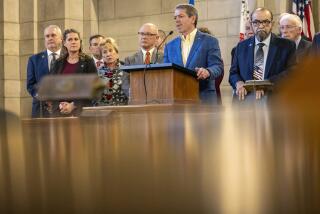Could food stamps be part of ‘fiscal cliff’ solution?
Negotiators in Washington like to say “everything is on the table” as they struggle to meet a year-end budget deadline. But the irony is that while looking for the big-ticket solution to avoid the automatic cuts and tax increases of the “fiscal cliff,” official Washington has been too preoccupied to move ahead on another bill that would save $23 billion to $35 billion.
The five-year farm bill is not a done deal, but legislators from agricultural states have said in recent days they could get it passed if Congress and President Obama expanded their thinking about how to avoid the year-end cliff. Deficit negotiators are looking for $500 billion in cuts and/or revenue increases over 10 years to avoid draconian automatic cuts and tax increases on Jan. 1.
A Reuters column this week suggested that the “best hope” for moving the agriculture legislation along would be if Congress tossed it into the year-end deficit cutting package. The wire service said Roger Johnson, of the National Farmers Union, thought that otherwise, a formal revamping of the law might not come until next year.
QUIZ: How much do you know about the ‘fiscal cliff’?
But the five-year, $500-million agricultural law has its own controversial elements — including proposed cuts in food stamps. The program, officially known as Supplemental Nutrition Assistance Program, or SNAP, grew to $76 billion annually in 2011, double what it was three years prior. Persistent unemployment and expanded eligibility under President Obama’s 2009 stimulus bill spurred the increases.
A version of the farm bill passed by the House agriculture committee envisions a $1.6-billion annual cut in the food stamp program — four times greater than a cut already approved in the Senate version of the legislation.
Farm state legislators hope that the pressures of the year-end negotiations on deficit reduction could help force a resolution, though many now think the agriculture legislation (and the food stamp program) will simply be extended with a stop-gap bill that would not include the reductions.
Any reductions in food stamps will be opposed by some Democrats. They note that the ranks of the poor remain high during the tentative economic recovery. They have argued that the benefits from the program, which amount to $1.40 a meal, are minimal for people in serious need. Some Republicans have argued the cuts should be even bigger, given the program’s astronomical growth.
A string of Democratic politicians has tried to illustrate their support of the program in recent years by taking the “Food Stamp Challenge” -- living on the equivalent of the federal food subsidy allowance for one week.
Newark Mayor Cory Booker this week said he intended to go on the low-cost menu for a week beginning Tuesday. Booker made the pledge after engaging in a running Twitter debate with a North Carolina woman about the need for food stamps. Among his arguments for keeping the program robust: “We have a shared responsibility that kids go to school nutritionally ready.”
The huge dollar figures being tossed about in Congress and the White House can be numbing. Booker hopes to put a human face back on a program that he said deserves support, no matter how steep the fiscal cliff.
@latimesrainey
More to Read
Get the L.A. Times Politics newsletter
Deeply reported insights into legislation, politics and policy from Sacramento, Washington and beyond. In your inbox three times per week.
You may occasionally receive promotional content from the Los Angeles Times.











